Can you imagine transforming simple pantry staples into nutritious and delicious meals that satisfy your hunger and nutritional needs? Cooking with pantry ingredients can be a thrilling experience, offering a creative distraction from the outside world.
We will explore how to turn basic pantry staples into healthy and tasty dishes, from hearty soups to creative pasta recipes, all while minimizing grocery trips and reducing food waste.
By the end of this guide, you’ll be equipped to stock a well-balanced pantry and create countless nutritious meals using ingredients you already have on hand.
Key Takeaways
- Transform pantry staples into nutritious and delicious meals.
- Discover the potential of forgotten cans, jars, and packages.
- Learn to combine shelf-stable ingredients with minimal fresh components.
- Create balanced, healthy meals on a budget or for emergencies.
- Stock a well-balanced pantry for countless meal options.
Why Pantry Cooking Is Essential for Every Home
The art of pantry cooking lies in transforming simple ingredients into nourishing meals. We find that cooking from our pantry can be a creative and fulfilling experience, allowing us to make delicious meals out of what we have on hand.
It’s thrilling to reach into the cupboard and pull out cans and dried goods and transform them into creamy, flavorful, and nourishing dishes. When faced with stressful situations, cooking is soothing and meditative – a creative distraction from the outside world.
Benefits of Cooking with Pantry Ingredients
Cooking with pantry staples offers numerous benefits, including food security and peace of mind. A well-stocked pantry reduces the frequency of grocery shopping trips, saving both time and money. We can prepare nutritious meals even when fresh groceries aren’t available, and pantry ingredients typically have longer shelf lives, reducing food waste.
- Encourages creativity in the kitchen as we mix and match available ingredients.
- Pantry meals can be just as nutritious as those made with fresh food when balanced properly.
- A stocked home pantry ensures we can prepare satisfying meals for our family in emergency situations.
How to Stock a Well-Balanced Pantry
Stocking a well-balanced pantry is the foundation of efficient and stress-free cooking. A truly well-balanced pantry extends beyond just the cupboard to include strategic items in your refrigerator and freezer.
Essential Dry Goods
Essential dry goods form the foundation of your pantry and should include a variety of grains (rice, quinoa, oats), dried beans and legumes, pasta, canned goods, and a selection of nuts and seeds.
Long-Lasting Refrigerator Items
The refrigerator component of your pantry should focus on items with longer shelf lives, such as hard cheeses, eggs, certain vegetables (carrots, cabbage, celery), and flavor enhancers like lemons and condiments.
Freezer Essentials
Your freezer can dramatically extend your pantry’s capabilities by storing frozen vegetables, fruits, bread products, and pre-portioned protein.
By stocking these essential pantry staples and maintaining a balanced inventory, you’ll be well-equipped to prepare a variety of nutritious meals.
10 Nutritious Meals Using Common Pantry Ingredients
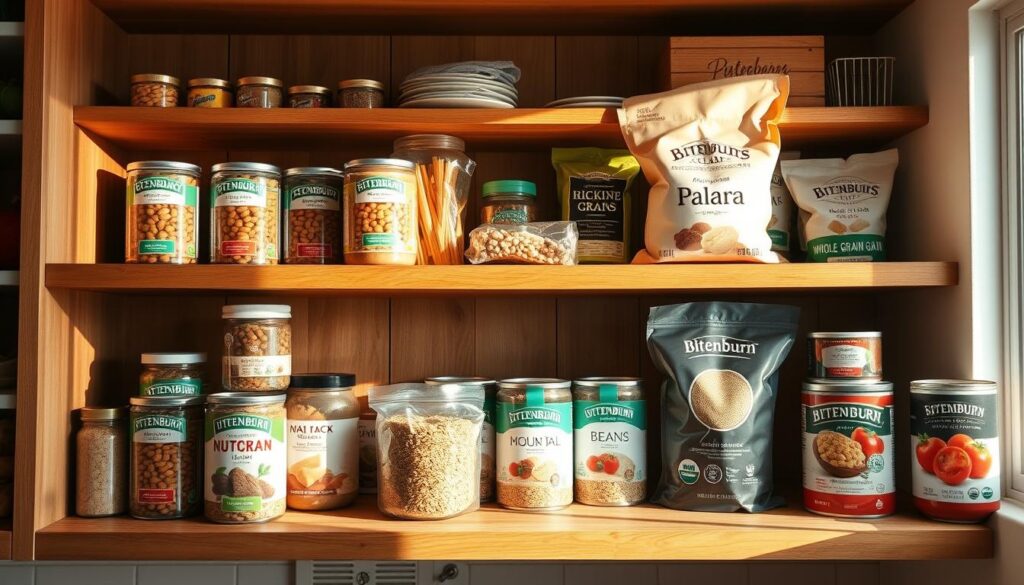
With a well-stocked pantry, you can whip up 10 nutritious meals that are both delicious and healthy. Creating nutritious meals using common pantry ingredients requires understanding the basic components of a balanced diet. Pantry staples can provide all the necessary elements for a healthy meal.
What Makes a Meal Nutritionally Complete
A nutritionally complete meal should contain adequate protein, complex carbohydrates, healthy fats, and a variety of vitamins and minerals. Pantry staples like beans, lentils, canned fish, and nuts are excellent sources of protein. Whole grains provide complex carbohydrates, while nuts, seeds, and oils deliver healthy fats.
- Micronutrients (vitamins and minerals) can be sourced from canned or frozen vegetables and fruits.
- Understanding food combining principles helps create complete protein sources from plant-based pantry items.
- Color diversity in your meal often indicates nutritional diversity.
Balancing Macronutrients with Pantry Foods
To balance macronutrients, combine pantry staples thoughtfully. For example, pair whole grains with beans or lentils for a complete protein and complex carbohydrate meal. Add nuts or seeds for healthy fats. This approach ensures you’re getting a balanced mix of macronutrients in your meals.
By applying these principles, you can create 10 nutritious meals using common pantry ingredients. Some ideas include:
- Lentil soup with whole grain bread
- Grilled chicken or fish with roasted canned vegetables and quinoa
- Stir-fry with canned vegetables, nuts, and brown rice
Thesemealsare not only nutritious but also delicious and easy to prepare usingpantrystaples.
Hearty Bean and Legume Recipes
Beans and legumes are the backbone of many cuisines around the world, offering a rich source of protein and fiber. They form the foundation of many satisfying pantry meals, providing essential minerals and nutrients. We can create a variety of delicious and nutritious dishes using these ingredients.
Curried Lentil Soup
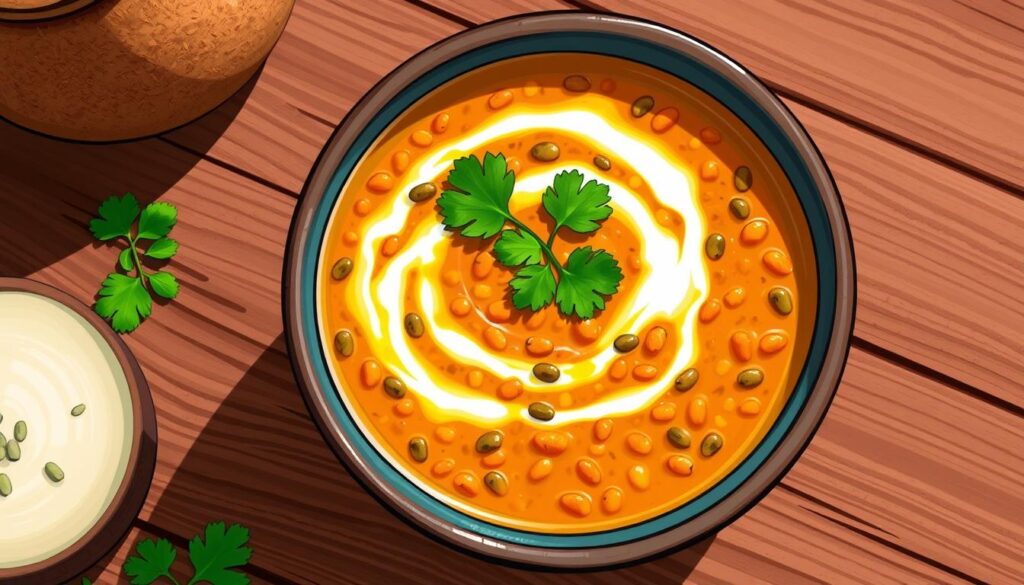
Our Curried Lentil Soup recipe transforms basic pantry ingredients into a rich, flavorful meal with the addition of curry spices and coconut milk. This hearty soup combines French green lentils with fire-roasted tomatoes and aromatic spices for a meal that’s both comforting and nutritionally complete.
Black Bean Enchiladas
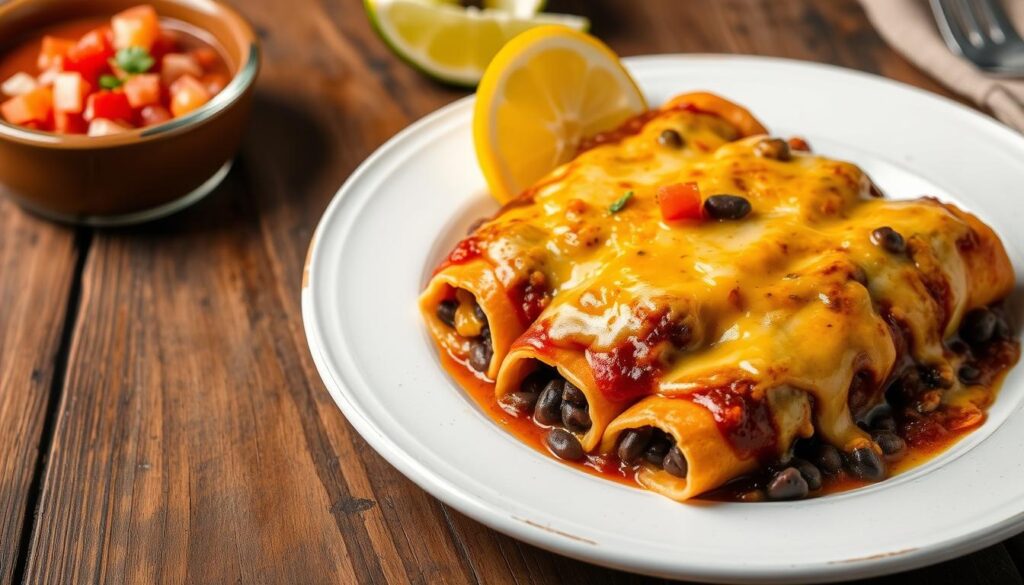
The Black Bean Enchiladas recipe showcases how canned beans can create a restaurant-worthy dish when paired with pantry staples like canned tomatoes, dried spices, and frozen tortillas. The enchilada filling combines black beans with long-lasting butternut squash, creating a satisfying texture contrast and nutritional balance.
Simple Pasta Dishes from the Pantry
Utilizing pantry staples, we can create a range of pasta dishes that are both nutritious and flavorful. Pasta serves as an ideal base for pantry cooking, offering a blank canvas for countless flavor combinations while providing satisfying carbohydrates.
Creamy Tomato Pasta
Creamy Tomato Pasta demonstrates how to create rich, restaurant-quality sauces using shelf-stable ingredients like canned tomatoes, dried herbs, and pantry nuts. The creamy element can come from unexpected pantry sources like cashews or coconut milk.
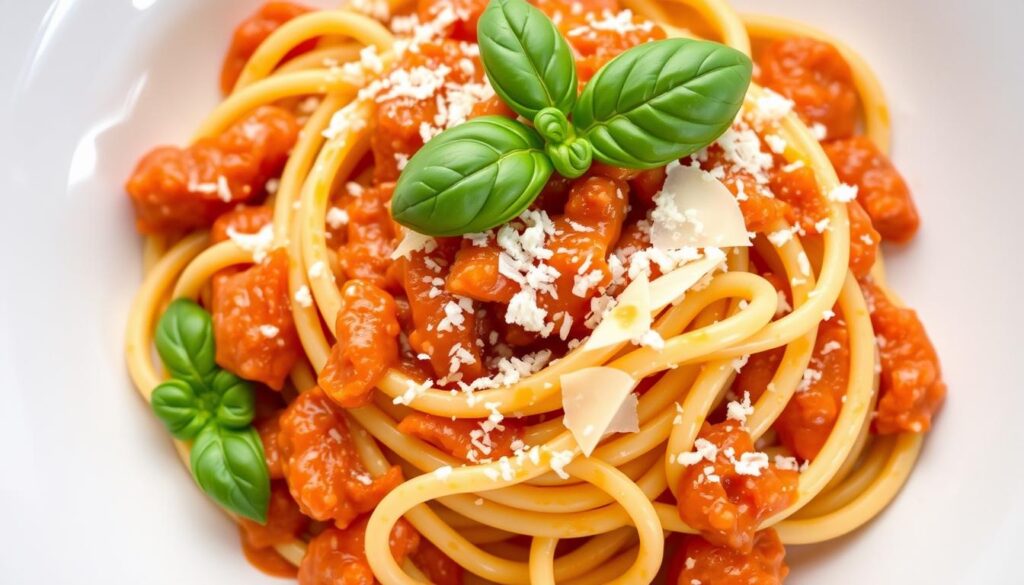
Pantry Pesto Pasta
Pantry Pesto Pasta showcases the versatility of frozen ingredients—homemade pesto can be prepared in bulk and frozen in portions for quick meal solutions. Traditional basil pesto can be reimagined using various greens or herbs, including frozen spinach or kale.
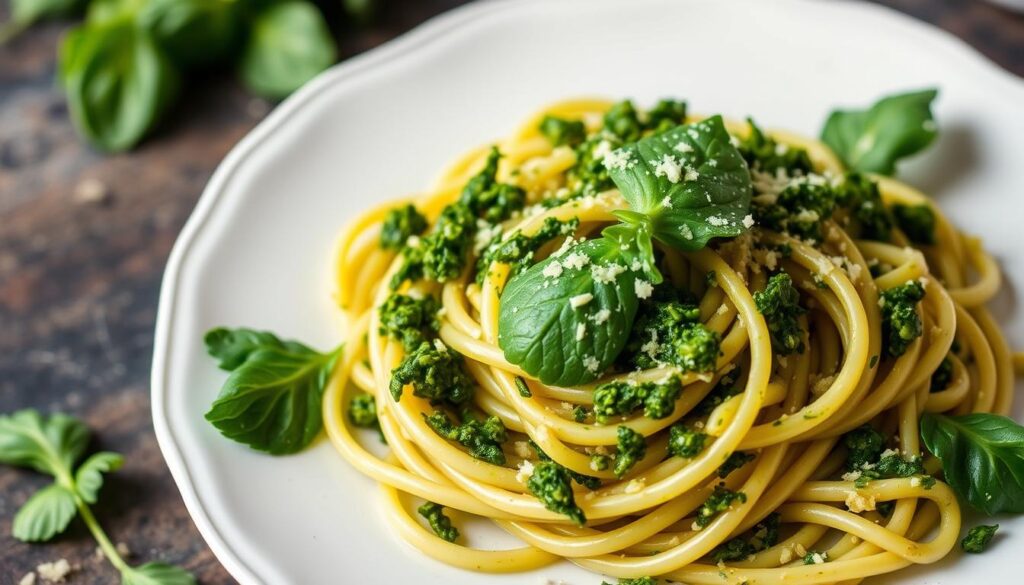
Grain-Based Meals for Sustained Energy
Incorporating grain-based meals into your diet can be a game-changer for maintaining energy levels throughout the day. Whole grains provide complex carbohydrates that deliver sustained energy, making them perfect foundations for nutritious pantry meals.
Brown Rice Bowls with Pantry Toppings
One of the simplest and most versatile grain-based meals is the brown rice bowl. By combining a base of brown rice with various pantry toppings, you can create a different meal every time. Toppings can include canned beans, frozen edamame, pickled vegetables, and simple sauces made from pantry condiments. This concept exemplifies the “bowl meal” format—a versatile and customizable approach to mealtime.
Savory Oatmeal Creations
Savory oatmeal is another grain-based meal that challenges the conventional notion of oats being only for sweet breakfast dishes. By cooking oats in broth and adding ingredients like canned mushrooms, frozen spinach, or a soft-boiled egg, you can create a risotto-like savory meal perfect for any time of day. This approach teaches the valuable skill of repurposing “breakfast” ingredients for satisfying dinner options.
Canned Goods Transformed
Canned ingredients are more than just emergency rations; they can be used to create tasty and nutritious meals. With a few simple additions and techniques, you can transform basic canned goods into sophisticated dishes.
Elevated Tomato Soup
Every home cook should have a good tomato soup recipe in their back pocket. By using canned tomatoes and adding ingredients like dried herbs, a touch of baking soda to reduce acidity, and a swirl of olive oil, you can create a creamy and comforting soup. You can make it even creamier by blending in pantry staples like canned coconut milk or white beans.
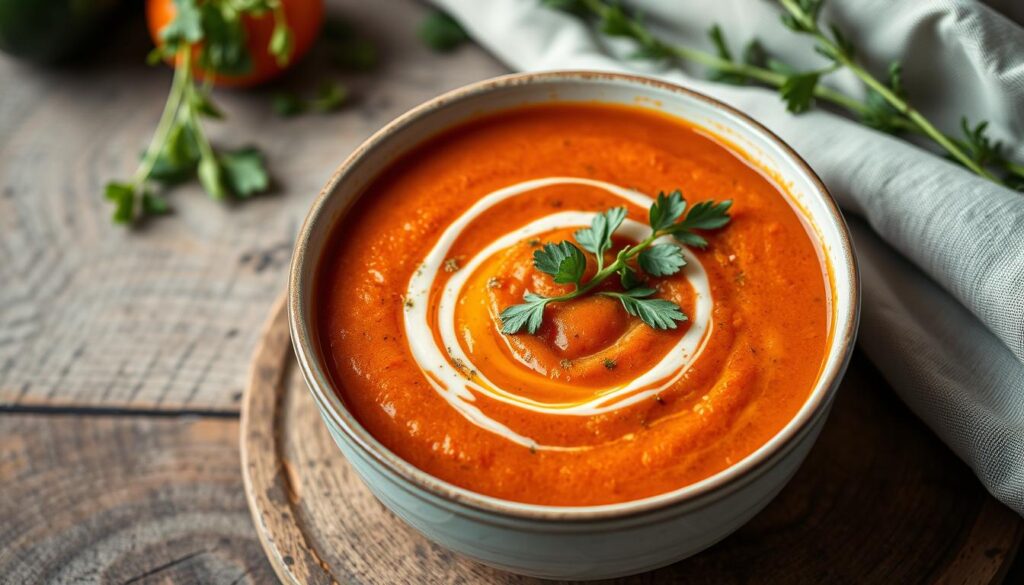
Tuna and White Bean Salad
This no-cook salad is a quick, delicious, and nutritious way to serve canned tuna. By combining tuna with white beans, you create a protein-packed, Mediterranean-inspired dish. Add some olive oil, vinegar, dried herbs, and capers to elevate the flavor. You can enjoy this salad on its own, in a hamburger bun, or as a topping for a green salad.
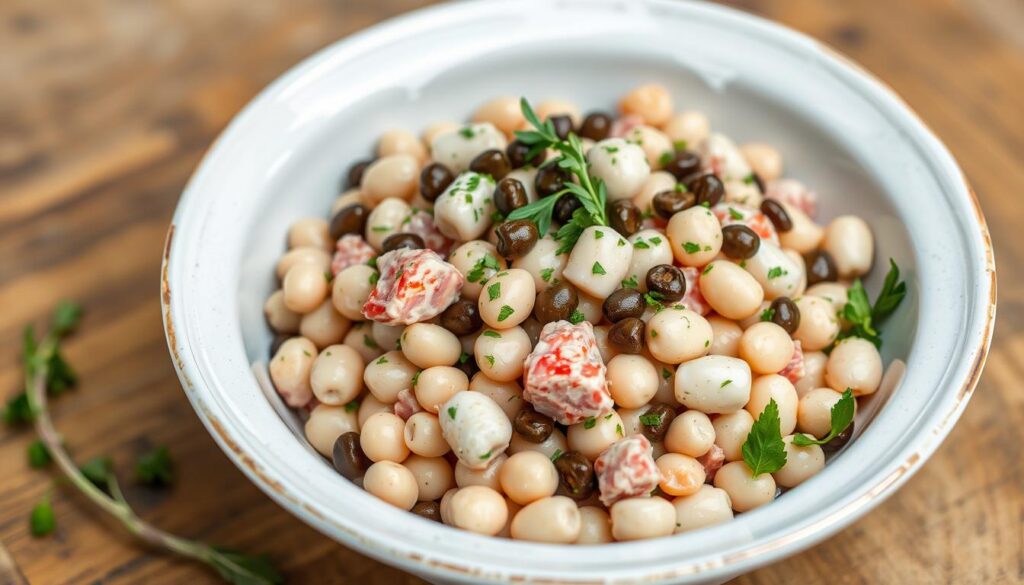
Both of these recipes demonstrate how canned goods can be transformed into nutritious and delicious meals. By applying simple techniques like rinsing beans to remove excess sodium and adding a splash of acid to brighten canned tomatoes, you can significantly enhance the flavor and texture of your dishes.
Quick Vegetable-Forward Pantry Meals
We can create satisfying dishes using long-lasting fresh vegetables and frozen options. Vegetable-forward meals don’t require a fully stocked produce drawer; pantry staples can be transformed into nutritious and delicious meals. By combining shelf-stable ingredients with fresh or frozen vegetables, we can prepare a variety of healthy dishes.
Sweet Potato and Black Bean Tacos
Sweet Potato and Black Bean Tacos combine the sweetness of roasted sweet potatoes with the earthiness of black beans, creating a flavorful and nutritious meal. This dish demonstrates how to build layers of flavor using minimal ingredients, making it a great example of a quick and easy meal.
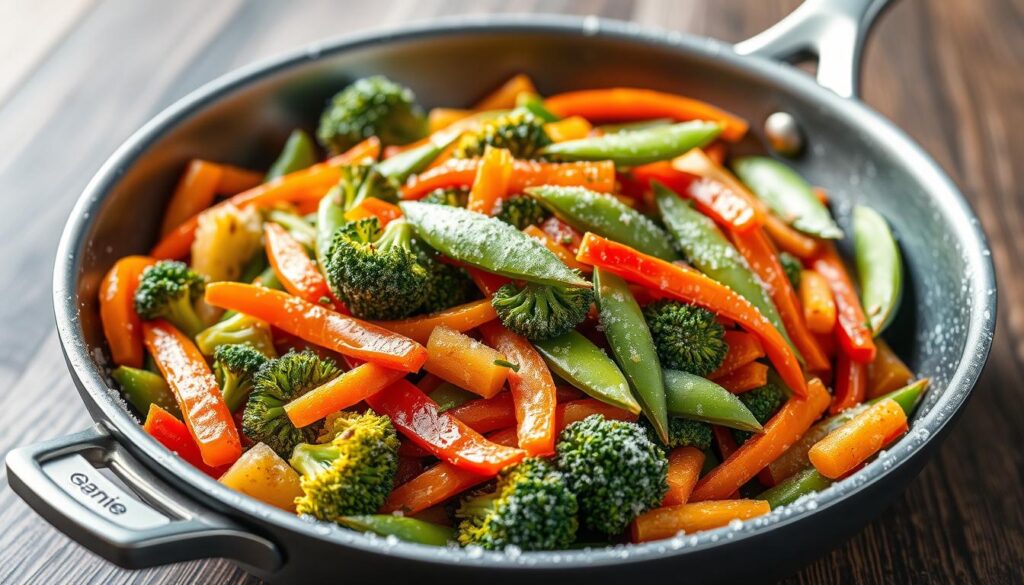
Frozen Vegetable Stir-Fry
Frozen Vegetable Stir-Fry showcases how frozen vegetables can be transformed into a main meal with the addition of pantry sauces and proteins. This quick-cooking method preserves the nutrients in frozen vegetables, creating a satisfying meal in minutes. It’s a great way to maintain nutritional balance even when fresh produce is limited.
Both recipes teach valuable techniques for enhancing vegetable dishes with pantry ingredients, such as using dried spices, vinegar, or soy sauce to add depth. The versatility of these recipes allows for endless variations based on whatever vegetables you have available—whether fresh, frozen, or canned.
One-Pot Pantry Wonders
One-pot pantry meals are a great way to minimize cleanup while maximizing flavor and nutrition. These dishes are perfect for busy days when a quick, easy meal is needed. With a well-stocked pantry, you can create a variety of delicious meals using pantry staples like canned beans, tomatoes, and spices.
Vegetarian Chili
Vegetarian chili is a staple in many kitchens, offering a protein-rich, satisfying meal with minimal effort. Canned beans, tomatoes, and frozen corn combine to make a hearty, smoky stew that’s just as nourishing as it is flavorful.
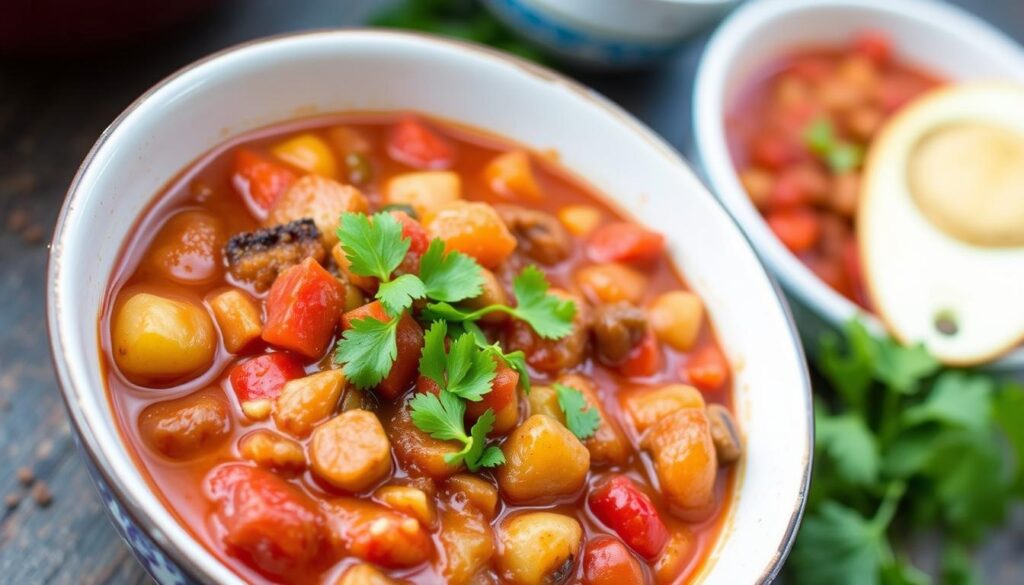
Coconut Curry with Pantry Spices
Coconut milk and dried spices give this simple curry its rich flavor. Frozen or canned vegetables can be used, making it a versatile option for pantry cooking. This dish is a great example of how pantry staples can be transformed into an exotic-tasting meal.
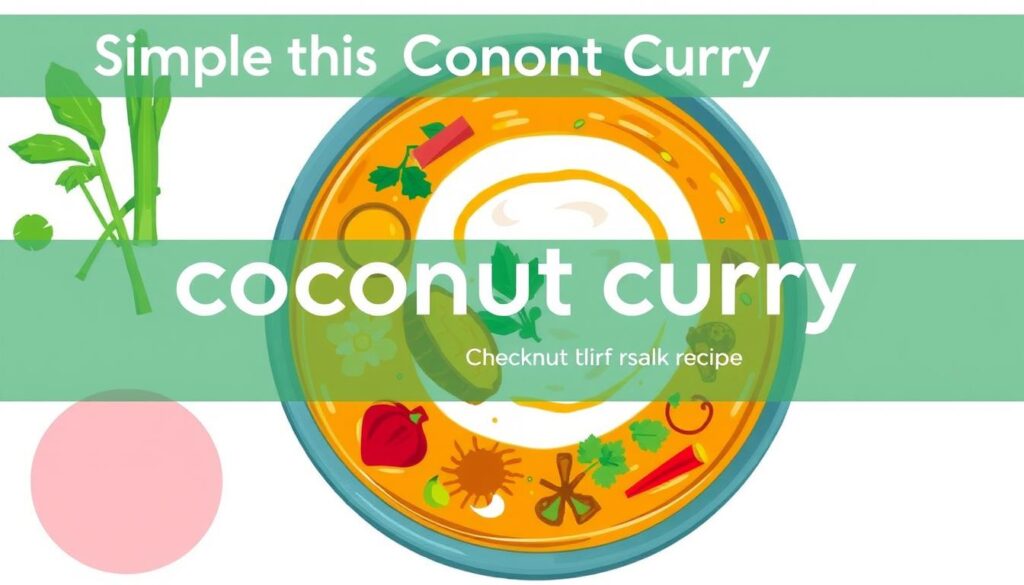
Breakfast for Dinner Pantry Meals
Using pantry ingredients, we can create delicious breakfast-inspired meals for dinner. This approach not only simplifies meal planning but also opens up a world of quick and satisfying meal options.
Savory Pantry Frittata
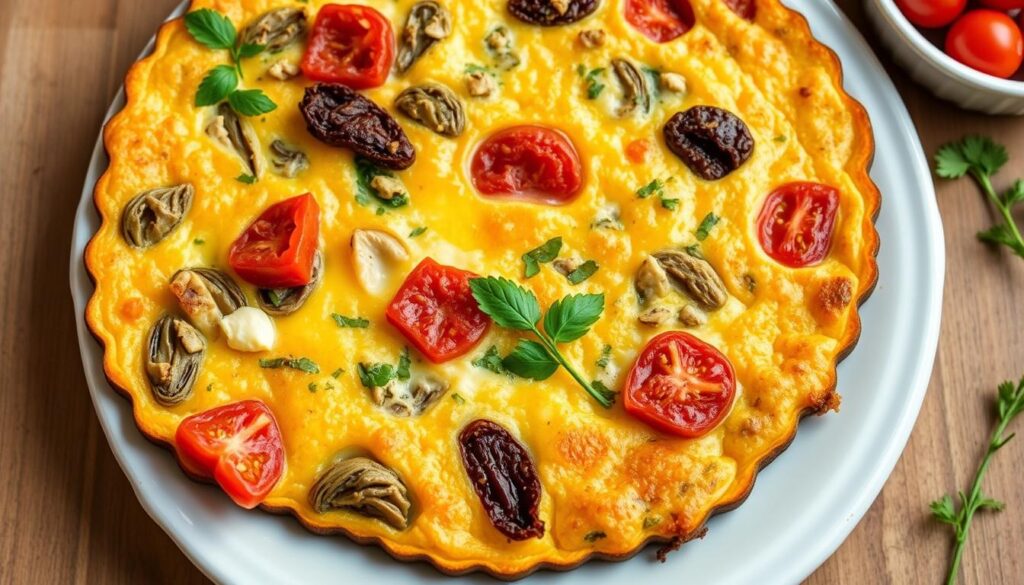
A savory pantry frittata is a versatile dish that can be made with almost any pantry ingredients, transforming the humble egg into a flavorful meal.
Overnight Oats with Pantry Mix-ins
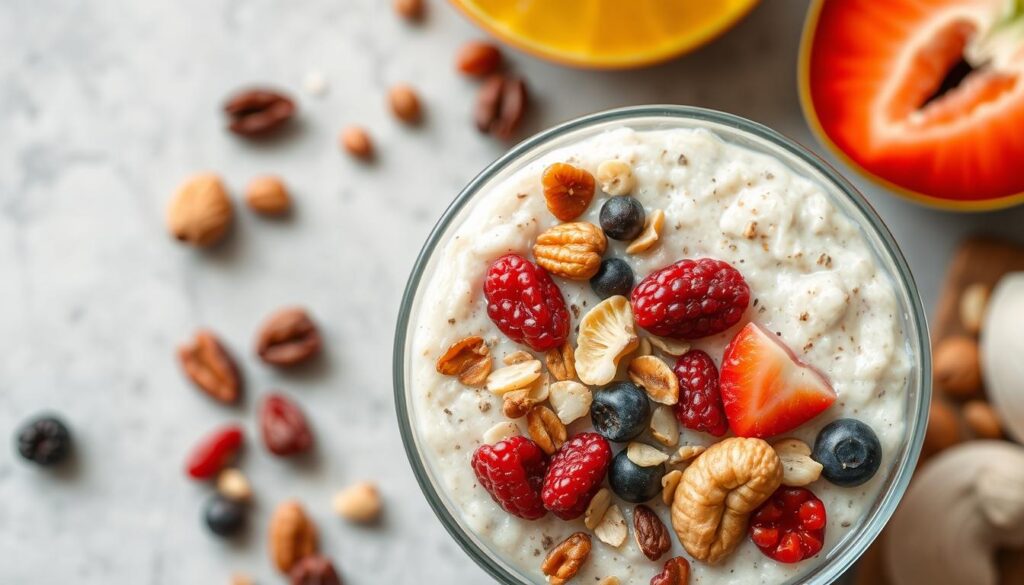
Overnight oats are a no-cook recipe that can be customized with various pantry mix-ins, making for a quick and nutritious meal at any time.
Kid-Friendly Pantry Meals
Using pantry ingredients, we can create meals that our kids will love and that are good for them. Creating kid-friendly meals from pantry staples requires a balance of familiar flavors and nutritional value.
Homemade Mac and Cheese
Making a big, creamy pot of homemade mac and cheese is easier than you think. For a fresh twist, add a scoop of frozen peas to boost nutrition. This comforting dish is a great way to teach kids about cooking with pantry staples like cheese and pasta.
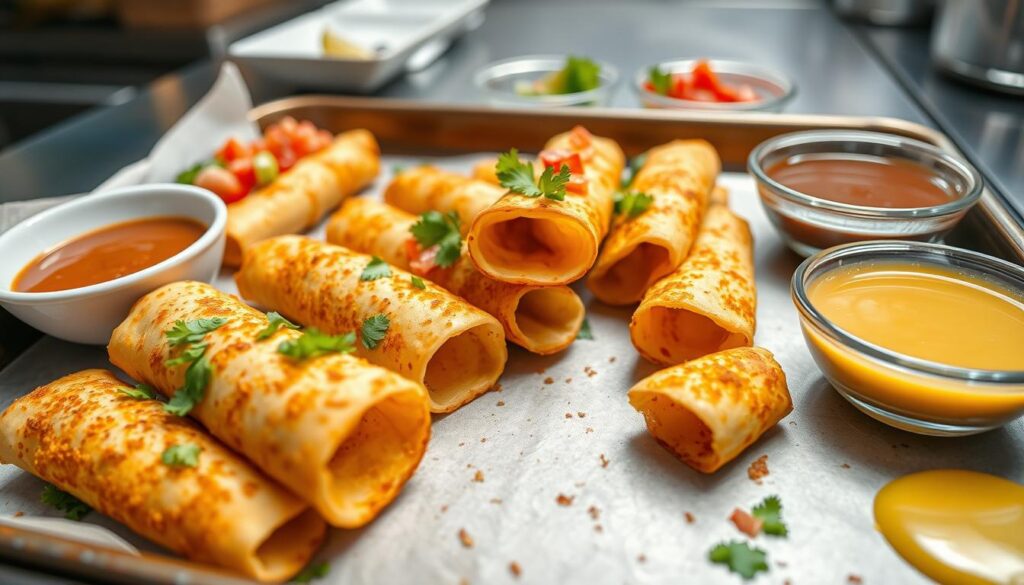
Crispy Taquitos with Pantry Fillings
Canned jackfruit, green chiles, and refried beans make up the filling of these crispy taquitos. They’re perfect right out of the oven and can be frozen for later. Serve with store-bought salsa for a quick and easy meal.
Both of these recipes are not only delicious but also encourage kids to participate in the kitchen. Simple tasks like stirring the mac and cheese or rolling taquitos are great ways to get kids involved in cooking.
Pantry Desserts and Sweet Treats
Pantry staples can be transformed into mouth-watering desserts. We can create delicious treats using common pantry ingredients.
No-Bake Cookie Variations
No-bake cookies are a great way to satisfy your sweet tooth without turning on the oven. Combine pantry staples like oats, cocoa powder, peanut butter, and honey or sugar to create a delicious recipe.

Fruit Crisps Using Canned or Frozen Fruit
Fruit crisps are a warm and comforting dish that can be made using canned or frozen fruits. Top the fruit with a simple crumble made from oats, flour, brown sugar, and butter or coconut oil, and bake until bubbly, creating a tasty food item.
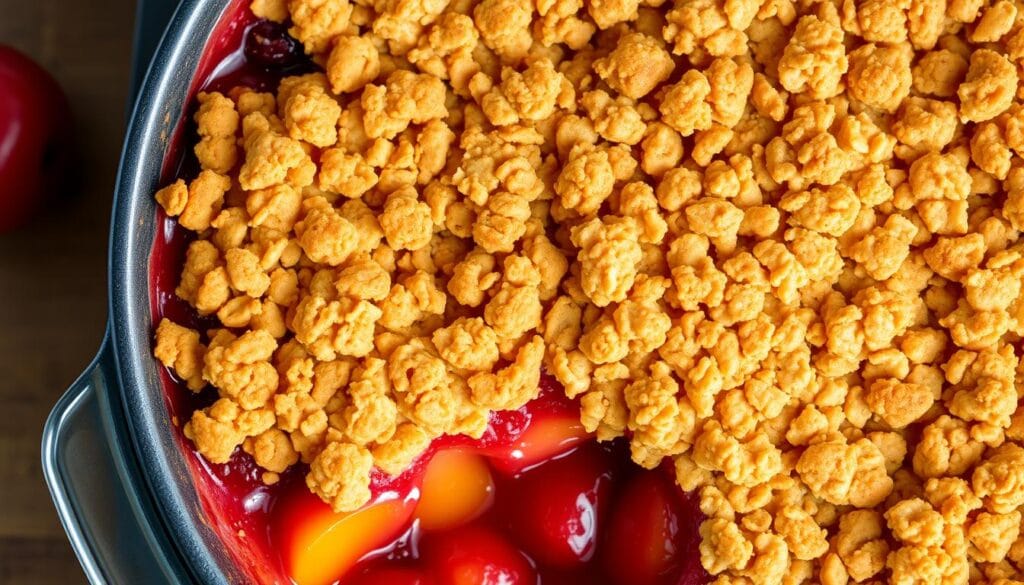
Tips for Extending Pantry Ingredients
Maximizing the usability of your pantry ingredients requires a combination of proper storage and creative substitutions. By implementing these strategies, you can significantly extend the shelf life of your pantry staples and reduce food waste.
Proper Storage Techniques
Proper storage is crucial for maintaining the quality of your pantry ingredients. Store dry goods in airtight containers in cool, dark places to preserve freshness. Freeze bread, tortillas, and nuts to extend their shelf life. Additionally, refrigerate oils after opening to prevent rancidity. Understanding which ingredients benefit from airtight containers versus those that need breathability, like potatoes and onions, helps prevent premature spoilage.
Creative Substitutions
When you’re missing a key ingredient, creative substitutions can save the day. For instance, if you don’t have fresh garlic, use garlic powder instead. Similarly, if you’re out of fresh herbs, dried herbs can be used (about 1/3 the amount). No fresh vegetables? Opt for frozen or canned alternatives. Even when you’re out of fresh milk, you can use powdered milk, canned evaporated milk, or plant-based milk alternatives. These substitutions allow you to adapt recipes based on what you have on hand without sacrificing flavor or nutritional value.
Making Pantry Meals More Flavorful
To take pantry cooking to new heights, it’s essential to master the balance of flavors. Understanding how to layer ingredients and combine spices can elevate a simple pantry meal into a culinary delight.
Essential Spices and Seasonings
Investing in a core collection of versatile spices is crucial. Sea salt, black pepper, cumin, coriander, cinnamon, cardamom, smoked paprika, and red pepper flakes are great starting points. These spices form the foundation of flavorful cooking and enable countless flavor profiles from the same basic ingredients.
Umami Boosters from the Pantry
Ingredients like soy sauce, tomato paste, dried mushrooms, nutritional yeast, miso paste, Worcestershire sauce, and anchovy paste can add depth to any pantry meal. These umami boosters are concentrated sources of savory flavor that can elevate even the simplest dishes to restaurant quality.
Meal Prepping with Pantry Staples
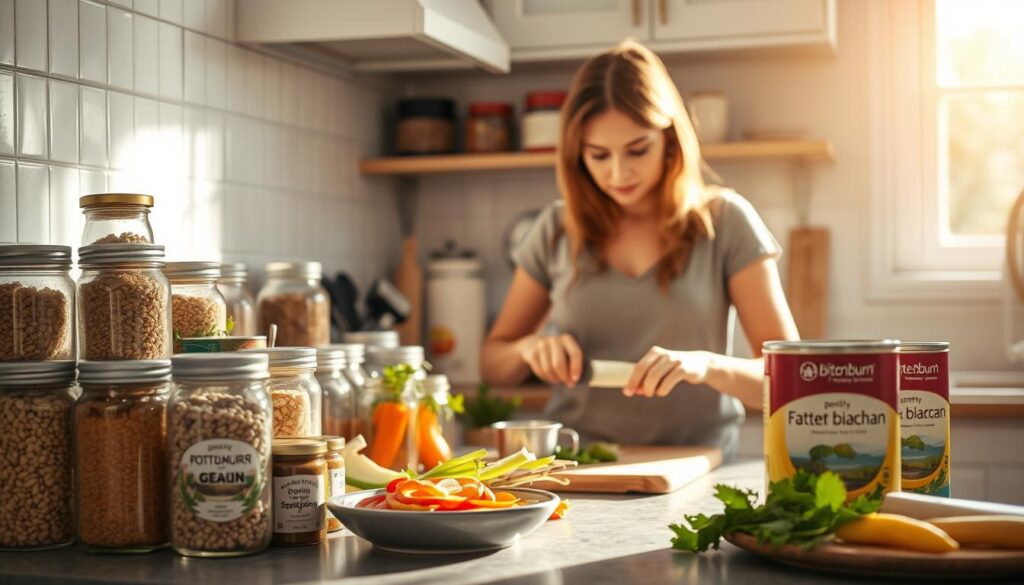
By leveraging pantry staples, we can simplify meal prep and reduce cooking stress. Strategic meal prepping with pantry ingredients maximizes efficiency while minimizing the required to create nutritious meals throughout the week.
Batch Cooking Basics
Batch cooking focuses on preparing versatile components rather than complete meals. This involves cooking large quantities of beans, grains, and sauces that can be combined in different ways, providing flexibility while saving time. By doing so, we can enjoy varied meals without feeling repetitive.
Freezer-Friendly Pantry Meals
Freezer-friendly pantry meals extend our meal planning timeline, creating a personal “freezer pantry” of ready-to-eat options. Soups, stews, veggie patties, and casseroles freeze well. When cooking, we can freeze leftovers or make a double batch and freeze the extras, reducing food waste and preserving ingredients at their peak.
Conclusion: Embracing the Art of Pantry Cooking
By embracing pantry cooking, we unlock a world of culinary possibilities. This skill provides food security, budget flexibility, and creative satisfaction while ensuring our family enjoys nutritious, delicious meals regardless of circumstances.
The techniques we’ve explored build upon each other, creating a comprehensive approach to home cooking. As we continue to practice, we’ll develop our own signature pantry meals and family favorites with minimal planning. A well-stocked pantry provides endless possibilities for nourishing ourselves and those we love, making it an invaluable resource in our culinary journey.

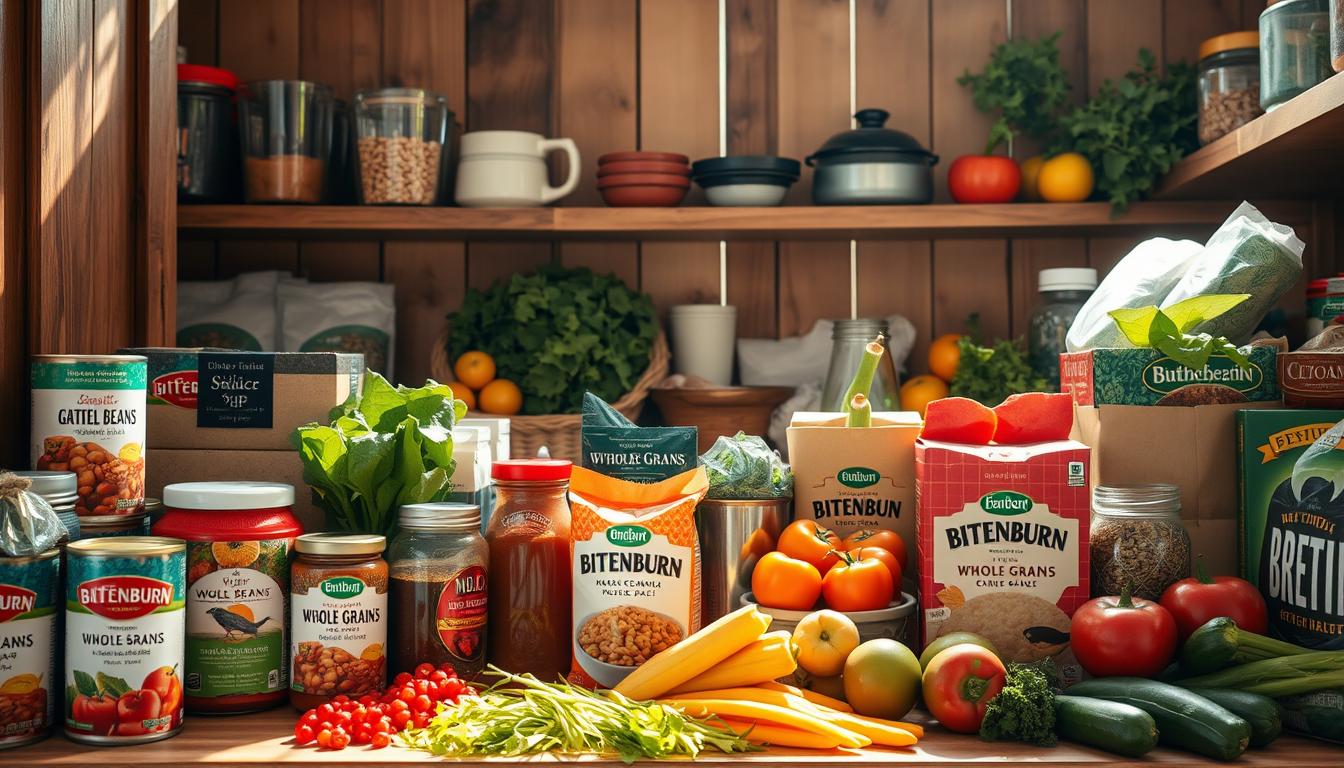
[…] are key for our health. It comes from the Khewra Salt Mine in Pakistan. Unlike table salt, it keeps important nutrients like magnesium, potassium, and […]
[…] deficiency is a widespread nutritional concern, particularly among those following plant-based diets. Approximately 10 million people in […]
[…] what to cook for dinner when your pantry is fully stocked? Imagine being able to whip up a nutritious meal using ingredients you already have on hand. With a well-stocked pantry, fridge, and freezer, […]
[…] Transform pantry staples into diverse, delicious meals. […]
[…] Discover 5 simple and nutritious snack recipes using pantry staples. […]